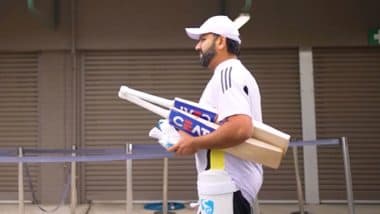
Lee Jin-woo, right, president of Korean Academy of Medical Sciences, speaks during the inaugural meeting of a consultative group launched to resolve a prolonged strike by trainee doctors, at the National Assembly in Seoul, Monday, as ruling People Power Party Chairman Han Dong-hoon, center, and Prime Minister Han Duck-soo listen. Newsis Talks begin as gov’t, ruling party seek way out of stalled walkout by trainee doctors By Jung Min-ho A consultative body consisting of the government, the ruling People Power Party (PPP), and the medical community has pledged to achieve what it described as "meaningful results" by the end of the year to resolve the ongoing strike by trainee doctors. Representatives of the PPP, the government and two major groups representing doctors gathered at the National Assembly in Seoul, Monday, for an inaugural meeting of the three-way body, while the main opposition Democratic Party of Korea (DPK), which initially agreed to participate, refused to join.
The meeting came nearly nine months after thousands of trainee doctors nationwide left their workplaces to protest the government's decision to significantly hike the annual medical school quota from the current 3,058 starting in the 2025 school year. After the meeting, Rep. Kim Sung-won, the PPP representative, told reporters that the participants will hold two meetings every week until late December to reach some form of consensus amid disruptions to emergency care and other services at major hospitals.

“The consultative body is scheduled to operate until the end of December, but we will try to produce meaningful outcomes by Dec. 22 or 23 to deliver a Christmas gift to the people,” he said. PPP Chairman Han Dong-hoon also pledged to do his part in turning the agreements made by the group into actual policies, urging other medical groups and the DPK to join the talks.
“It is a late but meaningful start,” he said. “The Korean Academy of Medical Sciences (KAMS) and the Korea Association of Medical Colleges will present a list of demands on behalf of doctors ..
. More participation from doctors could lead to a better, faster agreement.” This comes just a day after the impeachment of Lim Hyun-taek, the head of the Korean Medical Association (KMA), the country’s largest organization representing physicians.
The hardliner was removed for failing to coordinate opinions among various medical groups and making inappropriate comments about the disruptions to medical services. With the KMA scrambling to find a new, possibly more moderate leader, there is growing hope that it may reconsider its firm stance that the quota decision is unacceptable and should be fully retracted. However, no signs of concessions have been observed so far.
Speaking at the meeting, Lee Jin-woo, president of KAMS, said many doctors are deeply skeptical that the talks will yield any meaningful results. However, he added that he decided to participate in the consultative body out of concern that a lack of communication could lead to a more serious crisis. “The strife will never be resolved unless the government and the ruling party show a sincere attitude,” he said.
“This time, we hope they recognize the seriousness of the crisis and show their will to resolve it.” Park Dan, interim leader of the Korean Intern Resident Association, which is at the center of the conflict, also downplayed the prospect of the talks leading to any significant resolution. “PPP Chiarman Han Dong-hoon said he would speak with trainee doctors and medical students, who are the key parties at the heart of the matter.
He should first clarify his position on the idea of reversing the quota decision for the 2025 academic year,” he said in a social media post. He also reiterated his earlier stance, calling for the acceptance of the association's seven demands, which include the total annulment of the quota hike plan, improvements to the poor training and working conditions of junior doctors, and an apology for what he called the government's "unreasonable" order to force trainee doctors back to work. Prime Minister Han Duck-soo, the government representative at the talks, stated that the health care reforms go beyond just increasing the medical school quota, pledging to address the demands of trainee doctors for better working conditions and fair compensation.
In the meantime, the DPK, which decided not to join the body, said the talks will not be effective unless trainee doctors are included in the talks and the government changes its firm stance on the quota increase for the 2025 school year..










